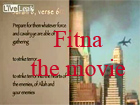« "Faith, Reason & The University": Pope Benedict's Speech At The University of Regensburg | Main | More Perpetual Outrage: 'Out of the Mosque, Into the Street' »
September 15, 2006
From Cartoon Jihad To Pope Jihad: Religion Of Perpetual Outrage Is Again - Outraged
Lets take a look at what all the fuss is really about!
As the entire world knows by now, Pope Benedict, in his speech at the University of Regensburg, quoted criticism of Islam and the Prophet Mohammed by 14th century Byzantine Emperor Manuel II Palaeologus, who wrote that everything Mohammed brought was evil and inhuman, "such as his command to spread by the sword the faith he preached" (not very big on tact, but in his defense, spreading faith by the sword does sound a bit evil and inhuman, does it not?). Looking at the global media and Muslim reaction to the lecture, one would think that the Pope lectured on something other than on faith, reason, and condemnation of violence, while inviting dialogue between faiths.
As much, but not all, of the Muslim world is lighting and flaming the fires of violence, we need to step back from the fray for a moment, and think about the fact that Muslims around the world are reacting violently and unreasonably to a lecture on faith, reason, and the condemnation of violence. ( Media reports include: Orthodox Church attacked repeatedly in Gaza, Islam row raises pope safety fears, Muslims Assail Pope's Remarks on Islam, , Muslim fury grows at Pope's speech, The Pope's message of greater dialogue achieves the opposite, Pope Gets it Wrong on Islam, Benedict's "blunder" was partly media-enhanced-UPDATED)
Although Reuters (via CNN.com) reports that Pope Benedict "repeatedly quoted Manuel's argument that spreading the faith through violence is unreasonable, adding: "Violence is incompatible with the nature of God and the nature of the soul" (Wow - and that incites violence, hatred, and intolerance?), you'll find his entire speech here - in which of the 43 total paragraphs, there are 6 paragraphs that even mention Emperor Manuel II Palaeologus or refer to him, and 2 of these paragraphs introduce the Emperor and his dialogue discussing reasons why spreading the faith through violence is something unreasonable, such as in the paragraph in which the Pope quotes the Emperor:
Violence is incompatible with the nature of God and the nature of the soul. "God is not pleased by blood, and not acting reasonably ("syn logo") is contrary to God's nature. Faith is born of the soul, not the body. Whoever would lead someone to faith needs the ability to speak well and to reason properly, without violence and threats.... To convince a reasonable soul, one does not need a strong arm, or weapons of any kind, or any other means of threatening a person with death...."I challenge you the reader, Reuters, and the "perpetually and easily outraged" Muslim leaders that are now unreasonably encouraging violence, to explain how in the hell anything in that paragraph and others like them is anything other than a discussion of what it is intended to be - a discussion on faith and reason! If these perpetually outraged Muslm leaders have a problem with faith and reason trumping violence, then it is the Muslim leaders that should have some explaining to do, not the Pope.
The paragraphs that contain anything that the Muslim leaders (and the Islamist apologist, Reuters) could find even remotely offensive, number just 3 out of the 42, and these 3 paragraphs are fully within the context of explaining the Emporer's position on faith, reason, and that violence is incompatible with the nature of God and the nature of the soul. Within these 3 paragraphs we find only 3 "sentences" that have to do with Muhammed and/or Islam and violence. Let's look at these and see what a religion that claims to be peaceful and tolerant yet is always for one reason or another perpetually outragedl, angry, and violent, finds so offensive:
In the seventh conversation ("diálesis" -- controversy) edited by professor Khoury, the emperor touches on the theme of the jihad (holy war). The emperor must have known that sura 2:256 reads: "There is no compulsion in religion." It is one of the suras of the early period, when Mohammed was still powerless and under [threat]. But naturally the emperor also knew the instructions, developed later and recorded in the Koran, concerning holy war.Having identified the offensive comments within the context in which they appear in the Pope's lecture, let's pull them out of context and go right to the core of the subject of the newest outrage from the perpetually outraged Muslim leaders, sentence by sentence:
Without descending to details, such as the difference in treatment accorded to those who have the "Book" and the "infidels," he turns to his interlocutor somewhat brusquely with the central question on the relationship between religion and violence in general, in these words: "Show me just what Mohammed brought that was new, and there you will find things only evil and inhuman, such as his command to spread by the sword the faith he preached."
The emperor goes on to explain in detail the reasons why spreading the faith through violence is something unreasonable. Violence is incompatible with the nature of God and the nature of the soul. "God is not pleased by blood, and not acting reasonably ("syn logo") is contrary to God's nature. Faith is born of the soul, not the body. Whoever would lead someone to faith needs the ability to speak well and to reason properly, without violence and threats.... To convince a reasonable soul, one does not need a strong arm, or weapons of any kind, or any other means of threatening a person with death...."
The decisive statement in this argument against violent conversion is this: Not to act in accordance with reason is contrary to God's nature. The editor, Theodore Khoury, observes: For the emperor, as a Byzantine shaped by Greek philosophy, this statement is self-evident. But for Muslim teaching, God is absolutely transcendent. His will is not bound up with any of our categories, even that of rationality. Here Khoury quotes a work of the noted French Islamist R. Arnaldez, who points out that Ibn Hazn went so far as to state that God is not bound even by his own word, and that nothing would oblige him to reveal the truth to us. Were it God's will, we would even have to practice idolatry.
- "Show me just what Mohammed brought that was new, and there you will find things only evil and inhuman, such as his command to spread by the sword the faith he preached."
- To convince a reasonable soul, one does not need a strong arm, or weapons of any kind, or any other means of threatening a person with death...."
- a work of the noted French Islamist R. Arnaldez, who points out that Ibn Hazn went so far as to state that God is not bound even by his own word, and that nothing would oblige him to reveal the truth to us. Were it God's will, we would even have to practice idolatry.
Sentence 1 is critical of Muhammed teachings of violence, and specifically gives the example of his command to spread faith by the sword. If one is truly peaceful and tolerant, and condemns violence, how can one find fault with the condemnation of such violence? Perhaps the problem lies in the qualifier - one must be truly peaceful, tolerant, and condemn violence in order that they not find fault with the condemnation of such violence, and therein apparently lies the problem for the perpetually outraged Muslim leaders. For the Emperor and the Pope, as it should be with all men of reason, spreading a faith by violence is unreasonable, and against the nature of God and the soul. If you have a problem with the Emperor's (or the Pope's) understanding of what Muhammed taught (is it different than as written in the Quran?), and you are a reasonable, non-violent, tolerant human being, would you not choose to take issue with the Pope's reference to this particular teaching - through dialogue? After all, that is exactly what the Pope is suggesting in his lecture.
Sentence 2 simply emphasizes the fact that a strong arm, or weapons of any kind, or any other means of threatening a person with death or violence, is unnecessary to convince a reasonable soul. The lecture is about faith and reason, not violence. For people such as the Emperor and the Pope, violent jihad and forced conversion is not only unreasonable and against the nature of God, it is unnecessary. To believe otherwise, is to condone violence and is contrary to reason. Are our perpetually outraged Muslim clerics, in their expressions of outrage, in-facto admitting that they lack reason and condone violence? As with Sentence 1, If you have a problem with the Emperor's (or the Pope's) understanding of what Muhammed taught (is it different than as written in the Quran?), and you are a reasonable, non-violent, tolerant human being, would you not choose to take issue with the Pope's reference to this particular teaching - through dialogue?
Sentence 3, in referring to the work of the noted French Islamist R. Arnaldez and his reference to Ibn Hazn, the Pope is simply pointing out that in Muslim teaching, God is absolutely transcendent. His will is not bound up with any of our categories, even that of rationality. Again, as with Sentence 1 and Sentence 2, if you are a reasonable, non-violent, tolerant human being, you would choose to take issue with the Pope's reference to this particular point through dialogue on the basis of theological, philosophical, and doctrinal points, would you not?
The Muslim reactions to Pope Benedicts lecture make the Pope's point for him. Islam is in dire need of reform, and it is time for truly moderate Muslims to stand up and be counted, let their voices be heard over the jihadists and the troublemakers, and turn back the dreadful deadly tide of jihadism that threatens the peace of the world. The Popes intentions were honorable and reasonable, and were directed to an academic audience, not the street jihadists and the reactionary and easily outraged Muslim clerics that are constantly on the watch for yet another issue to light up the fires of hate and violence throughout the Muslim world.
As Professor Bainbridge points out in his piece, "Post Christian Europe", this Pope is not a politician trying to manipulate the media, but a theologian trying to preach what he believes to be the truth, which is exactly what the Vicar of Christ ought to do. After all, how communications-savvy was Jesus?
Related: Right Truth - Pope's comments and Muslim reaction, let's review
Cross posted from Hyscience
Posted by Richard at September 15, 2006 10:36 PM


